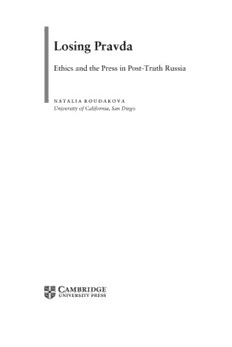
Losing Pravda PDF
Preview Losing Pravda
Losing Pravda Ethics and the Press in Post-Truth Russia natalia roudakova UniversityofCalifornia,SanDiego UniversityPrintingHouse,CambridgeCB28BS,UnitedKingdom OneLibertyPlaza,20thFloor,NewYork,NY10006,USA 477WilliamstownRoad,PortMelbourne,VIC3207,Australia 4843/24,2ndFloor,AnsariRoad,Daryaganj,Delhi–110002,India 79AnsonRoad,#06–04/06,Singapore079906 CambridgeUniversityPressispartoftheUniversityofCambridge. ItfurtherstheUniversity’smissionbydisseminatingknowledgeinthepursuitof education,learning,andresearchatthehighestinternationallevelsofexcellence. www.cambridge.org Informationonthistitle:www.cambridge.org/9781107171121 DOI:10.1017/9781316817117 ©NataliaRoudakova2017 Thispublicationisincopyright.Subjecttostatutoryexception andtotheprovisionsofrelevantcollectivelicensingagreements, noreproductionofanypartmaytakeplacewithoutthewritten permissionofCambridgeUniversityPress. Firstpublished2017 PrintedintheUnitedStatesofAmericabySheridanBooks,Inc. AcataloguerecordforthispublicationisavailablefromtheBritishLibrary. ISBN978-1-107-17112-1Hardback ISBN978-1-316-62977-2Paperback CambridgeUniversityPresshasnoresponsibilityforthepersistenceoraccuracyof URLsforexternalorthird-partyinternetwebsitesreferredtointhispublication anddoesnotguaranteethatanycontentonsuchwebsitesis,orwillremain, accurateorappropriate. Losing Pravda What happens when journalism is made superfluous? Combining ethnography, media analysis, and moral and political theory, this book examinesthe unravellingofprofessional journalism inRussia duringthe 1990s and 2000s and its effects on society. It argues that contrary to widespread assumptions, late Soviet-era journalists shared a cultural contractwiththeiraudiencesthatensuredthattheirworkwasguidedby a truth-telling ethic. Postcommunist economic and political upheaval led not so much to greater press freedom as to the deprofessionalization of journalismbecausejournalistsfoundthemselveshavingtomonetizetheir truth-seeking skills. Thishas culminatedin aperception of journalistsas politicalprostitutes,ormembersofthe“secondoldestprofession”,asthey arecommonlytermedinRussia.Roudakovaarguesthatthisculturalshift has fundamentally eroded the value of truth-seeking and truth-telling in Russiansociety.BeyondRussia,thisbookillustrateswhatcouldhappento a country’s public life when collective truths are regularly displaced by systematicfalsehoodsandfabrications. natalia roudakova is Assistant Professor of Communication at the University of California, San Diego. Educated in both the Soviet Union and the United States, she draws on her linguistic, political and social knowledge of the region. Her work combines cultural anthropology, political communication, political theory, moral philosophy, and the studyofRussianhistoryandcontemporarysocietyandculture. Formyparents,AnnaRudakovaandVladimirRudakov Contents Acknowledgments pageix Introduction 1 1 EthicsandPoliticsinSovietJournalism 51 2 JournalismandCapitalism:TheFirstEncounter 98 3 FromtheFourthEstatetotheSecondOldestProfession 125 4 TheSpiralofCynicisminthe2000s 157 5 TryingaLifewithoutIronyintheEarly2010s 196 Conclusion 217 Bibliography 225 Index 259 vii Acknowledgments Ihavebeenveryfortunatetohavehadthesupportofmanypeopleand institutions in the process of writing this book. First and most important, thanks go to the journalists in the city of Nizhny Novgorod in Russia, whose trust in me and in my project made fieldwork for this book possible. I am especially grateful to Vladimir Lapyrin, Irina Panchenko, Galina Shcherbo, Olga Morozova, Yulia Sukhonina, Natalia Rezontova, Larisa Solovyova, and Valentina Buzmakovaforguidingmethroughfieldwork.Ialsothanknumerous other journalists who appear pseudonymously in this text and many others who do not. Marina Metneva, Natalia Chistyakova, Xenia Zadorozhnaya, and Daria Miloslavskaya offered genuine friendship in Nizhny Novgorod and Moscow, making my time in those cities productiveandenjoyable. This book began as a doctoral dissertation at the Department of Cultural and Social Anthropology at Stanford University. There my deepest gratitude goes to my dissertation committee. Sylvia Yanagisako, my admirable advisor, patiently guided me through the process of becoming a scholar. Jim Ferguson joined the committee relativelylatebutbecameinstrumentalinhelpingmeseemyproject’s broaderrelevance,bothinanthropologyandbeyond.Hisengagement with my work and his faith in me were a real privilege. I thank Ted Glasser for his open-mindedness and numerous discussions and for consistently being there for me. Thank you to Alexei Yurchak for giving me a unique perspective on the Soviet period early on in the projectandforpushingmetothinkcriticallyandcreatively. My colleagues at the Department of Communication at the University of California San Diego (UCSD) provided me with an outstanding intellectual environment that nurtured this project further. I am especially grateful to Dan Hallin, Val Hartouni, Robert Horwitz, Elana Zilberg, Kelly Gates, and David Serlin for their mentorship, inspiration, friendship, and sound advice. Beyond the ix x Acknowledgments department,Iamgratefultohavehadtheintellectualhomewithinthe Program for Russian, East European and Eurasian Studies at UCSD. There the academic fellowship and friendship of Amelia Glaser, MarthaLampland,andBobEdelmanhavebeeninvaluable. Beyondmyhomeinstitutions,Ithankmanycolleaguesinthefieldsof anthropology and communication for their stimulating engagement with my work over the years. In anthropology, I am particularly indebted to Naomi Schiller, Robert Samet, Tomas Matza, Dominic Boyer, Nancy Ries, Michele Rivkin-Fish, and Thomas Wolfe; in communication and media studies, my debt goes to John Peters, James Curran, Michael Schudson, Karin Wahl-Jorgensen, Isabel Awad, Olessia Koltsova, and Yuezhi Zhao. All of them have been very generous with their time and intellectual energy, and many of them have read and have helped to improve parts of the manuscript atcriticalstages. My sincere thanks also go to Harry Humphries and Deborah Ballard-Reisch,thefirstUSacademicsIcametoknowwhileIwasan undergraduate student in Kazan, Russia. They inspired me to pursue graduate education in the United States, for which I am forever grateful. Thebulkofthefieldworkforthisprojectwasfundedbyagenerous grant from the Wenner-Gren Foundation for Anthropological Research. Follow-up trips to Russia were supported by the American Councils for International Education and the International Research andExchangeBoard.Anothergenerousfellowship–fromtheInstitute forInternationalStudiesatStanford–fundedmygraduatestudiesand helped me complete the dissertation, and grants from the Soros Foundation,theSocialScienceResearchCouncil,andtheHavighurst CenterforRussianandPost-SovietStudiesatMiamiUniversity,Ohio, offered valuable opportunities to present and discuss my work with wideraudiences.Iamgratefultoallofthoseorganizations. The majority of the book was written while I was a Fellow at the Center for Advanced Study in the Behavioral Sciences at Stanford University in 2013–14, with additional funding from the University of California’s President’s Faculty Research Fellowship and the Hellman Research Fellowship. I wholeheartedly thank those institutions for their support. The intellectual atmosphere at the Center for Advanced Study at Stanford was truly unique, and this book owes much to the daily conversations that took place there.
